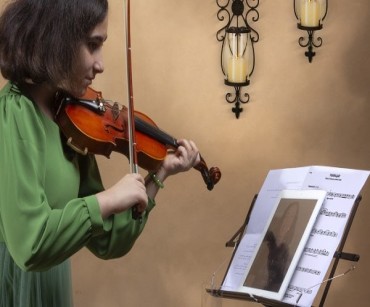
Exploring the Significant Role of Music Education in Children's Lives
Introduction
Music, a universal language capable of evoking profound emotional responses, is integral to human culture and personal development. While it is indeed a rich source of entertainment and pleasure, music's value extends far beyond this realm. Especially for children, learning music—whether it is mastering the piano, understanding music theory, or honing the voice—provides a broad spectrum of developmental benefits. This essay aims to delve into the vast significance of music education in children's lives, exploring its historical roots, developmental benefits, connection with academic achievement, and its potential to shape future generations.
The discourse will initiate with a historical overview of music education, tracing the evolution of children's introduction to the world of melodies and rhythms. The subsequent sections will elucidate the multifaceted benefits of learning music, shedding light on the cognitive, emotional, social, and physical facets of development. Furthermore, an analysis of how music education intertwines with academic performance, backed by scientific studies and data, will follow. The essay will then showcase the practical implementation and impact of music teaching strategies. Finally, we will probe into the future of music education, assessing its relevance in the digital age and the role of technology in transforming its landscape.
Historical Background of Music Education
The roots of music education for children can be traced back to ancient civilizations. In Greece, for instance, music was seen as an essential component of a well-rounded education, and children were taught to play instruments like the lyre. The Renaissance and Baroque periods marked the formal introduction of music in schools with an emphasis on singing and learning music theory. As we moved into the classic era, instruments such as the piano gained prominence, paving the way for the development of more comprehensive and complex music lessons for children.
The pedagogical approaches to music education experienced significant shifts over time, shaped by societal, cultural, and technological changes. For instance, in the early 20th century, a music education philosophy known as the Kodály method emerged, advocating that musical instruction should begin at a young age and focus on vocal music. In the late 20th century, Suzuki, a Japanese violinist, introduced a method where children learn music in a similar way to how they acquire language, highlighting the importance of environment and repetition.
These historical shifts have left a profound imprint on modern music teaching methodologies. The importance of early music education, focus on singing, instrumental training, and understanding music theory has become cornerstones of current practices. The piano, one of the most versatile instruments, often serves as a gateway for children to explore the vast landscape of music. The evolution and diversity of music education methods highlight its dynamic nature, simultaneously celebrating tradition and embracing innovation. These rich historical influences continue to shape our understanding of the role and importance of music education for children.
Developmental Benefits of Music Education
Delving into the world of music is much more than just understanding music theory or learning to play the piano. It is a multifaceted learning journey that catalyzes a remarkable range of developmental benefits in children, including cognitive, emotional, social, and physical improvements.
From a cognitive perspective, music education can profoundly enhance children's mental capabilities. Studying music theory, learning to read musical notation, or discerning different chords on a piano engages and challenges the brain in unique ways. This mental exercise cultivates a child's memory and attention span. For example, memorizing a piano piece requires consistent rehearsal, thereby fostering strong memory skills. Additionally, interpreting sheet music demands intense concentration, effectively enhancing attention span. Research has also indicated a positive correlation between music education and a higher intelligence quotient (IQ), suggesting that the cognitive stimulation provided by musical engagement may boost overall intellectual capacity.
Emotionally, music education serves as a powerful tool for nurturing emotional intelligence. It encourages self-expression, assists in understanding and managing emotions, and fosters an increased sense of happiness. Playing a sorrowful piece on the piano can help children comprehend and express feelings of sadness, while an upbeat tune might evoke joy. Furthermore, engaging in music has been shown to reduce stress levels. Music's inherent soothing qualities, combined with the focus and satisfaction derived from practicing an instrument or singing, contribute to a healthier emotional state.
The social benefits of music education are no less significant. Participating in a school choir, a youth orchestra, or simply playing a duet on the piano can promote essential social skills like communication, teamwork, and empathy. Music inherently involves sharing and interacting with others, whether it's harmonizing in a choir or synchronizing in an orchestra. These experiences nurture a sense of cooperation and mutual understanding, thereby fostering empathy. Moreover, the shared joy, challenges, and successes inherent to these musical engagements can foster deep social bonds and a sense of belonging.
Physically, music education, especially instrumental practice, can greatly contribute to the development of fine motor skills and coordination. Playing an instrument like the piano necessitates complex finger movements and coordination between hands and eyes. This can effectively enhance manual dexterity and hand-eye coordination. Additionally, rhythmic exercises, which are fundamental to music education, promote a sense of rhythm and timing, aiding in physical coordination and balance.
Music education thus serves as an extraordinary developmental tool, reaping benefits that span cognitive, emotional, social, and physical domains. Learning music theory, playing the piano, singing in a choir, or simply tapping out a rhythm—all these activities provide a unique and enriching educational experience, helping to nurture well-rounded, capable, and emotionally attuned individuals. As the multifaceted benefits of music education continue to unfold through research, its pivotal role in children's comprehensive development becomes increasingly evident.
Music and Academic Achievement
The symphony of learning that emerges from music education reverberates far beyond mastering a piano sonata or deciphering music theory. It resonates within the larger sphere of academic achievement, casting a positive influence on various facets of educational performance.
A harmonious relationship exists between music education and academic performance. The skills acquired and honed through musical pursuits, such as critical thinking, pattern recognition, memory enhancement, and perseverance, can translate into higher academic outcomes. For instance, a child proficient in playing the piano or reading sheet music engages in complex mental processes that can enhance mathematical ability and reading comprehension. These abilities aren't confined to music but permeate other academic arenas, facilitating overall scholastic achievement.
Numerous studies lend credence to this association. A notable example is a longitudinal study by the University of British Columbia, which found that students involved in high-quality music programs scored, on average, 11% higher on standardized tests compared to peers not engaged in music. Moreover, a meta-analysis of 6,984 students revealed that music-based interventions led to significant improvements in reading and mathematical skills. Such findings underscore the substantial impact of music education on bolstering academic performance.
Further, music education plays a pivotal role in augmenting learning in other subjects. A well-tuned piano lesson or a thorough understanding of music theory can serve as a platform for exploring subjects like math, language, and science. For instance, the rhythmic patterns in music can enhance understanding of fractions and patterns in math. The lyrical aspects of songs can improve language skills, enrich vocabulary, and foster a deeper understanding of poetic devices. The physics of sound, explored through different musical instruments, can lay the groundwork for understanding complex scientific principles. Thus, music serves as a conduit, connecting and enhancing various academic subjects.
In essence, music education, often seen as the crescendo of creativity, is, in fact, a potent catalyst for academic achievement. Whether it is through striking the keys of a piano, humming a melody, or dissecting the complex layers of music theory, children are not merely composing a musical future, but an academic one as well. Hence, the implications of music education extend beyond the realm of notes and rhythm; it resonates powerfully within the halls of academic excellence, underpinning a holistic approach to education.
Future Implications: Music Education in the 21st Century
As we navigate the digital era, the importance of music education continues to resonate. The fusion of music and technology is revolutionizing the way children learn and interact with music. Apps and online platforms provide access to piano tutorials, music theory lessons, and even virtual ensembles, ensuring music education transcends geographical and financial barriers.
Technology is not merely a tool but a key player in shaping the future of music education. It enhances interactive learning, allowing children to delve into music theory with animated guides or perfect a piano piece with real-time feedback. It also opens up a world of global collaboration, enabling students to perform virtual concerts or exchange ideas with peers from different cultures.
In this rapidly evolving landscape, music education equips children for a future that values creativity, emotional intelligence, and adaptability. Music's inherent ability to nurture these skills primes children for success in an increasingly interconnected and digital world.
Conclusion
In conclusion, this essay has taken a holistic journey through the world of music education, tracing its historical evolution, understanding its multifaceted benefits, and recognizing its significant influence on academic achievement. We've seen the global manifestation of music education through different programs, each contributing uniquely to children's development, and explored the future implications of music education in the digital era.
Music education, be it through understanding music theory or learning to play the piano, holds an enduring significance in children's lives. It acts as a powerful conduit for their cognitive, emotional, social, and physical development, and serves as a cornerstone in fostering academic achievement. Music education is not merely a note in children's development; it is the symphony that orchestrates their holistic growth. As we continue to tune into the future, one thing remains clear: the song of music education will continue to play an essential role in shaping the children of tomorrow.


